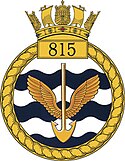815 Naval Air Squadron
| 815 Naval Air Squadron | |
|---|---|

Official 815 Naval Air Squadron Badge
|
|
| Active | Oct 1939 - Nov 1939 Nov 1939 - Jul 1943 Oct 1943 - Nov 1944 Dec 1944 - 1945 1947 - July 1958 Sep 1958 - Aug 1959 Sep 1959 - Dec 1960 Jul 1961 - Oct 1966 Jan 1981 - present |
| Country |
|
| Branch |
|
| Type | Naval Air Squadron |
| Role | Maritime Attack |
| Part of | Fleet Air Arm |
| Garrison/HQ | RNAS Yeovilton (HMS Heron) |
| Motto(s) | Strike Deep |
| Equipment |
Westland Lynx HMA.8 SRU AgustaWestland Wildcat HMA.2 |
| Battle honours | North Sea 1940 Mediterranean 1940-42 Taranto 1940 Libya 1941-42 Matapan 1941 Burma 1944 East Indies 1944 Falkland Islands 1982 Kuwait 1991 |
| Commanders | |
| Current commander |
Commander M TAZEWELL, RN |
| Ceremonial chief | HRH The Duke of Edinburgh |
815 Naval Air Squadron is a squadron of the Fleet Air Arm, part of the Royal Navy. The squadron is currently based at RNAS Yeovilton (HMS Heron) in Somerset, United Kingdom and it is the Navy's front line Lynx Naval Air Squadron. It currently comprises Westland Lynx Helicopter Maritime Attack (HMA) Mk8's and AgustaWestland Wildcat HMA.2's helicopters. It is the largest helicopter squadron in western Europe.
The squadron initially formed at RNAS Worthy Down on 9 October 1939, from the remnants of 811 and 822 squadrons that had survived the sinking of their carrier HMS Courageous in September 1939, with Fairey Swordfish aircraft. The squadron disbanded in November 1939, but reformed the same month however. In May 1940 the squadron provided support to the Dunkirk evacuation. In June 1940 the squadron embarked on HMS Illustrious and sailed for the Mediterranean in August, attacking and minelaying Benghazi, Rhodes and Tobruk. The squadron gained early fame with its involvement in the Battle of Taranto in 1940. The battle consisted of a raid on the Italian Battlefleet in harbour at Taranto which redefined the use of air power from the sea. During the battle only one squadron aircraft was lost (unfortunately with the Squadron's Commanding Officer), compared to the crippling of half the Italian Fleet. In March 1941, the squadron was once again involved in a major battle of the Second World War at the Battle of Cape Matapan. The squadron re-equipped in August 1941 with a mixture of Swordfish and Fairey Albacore aircraft, operating from shore bases in support of the North African campaign. In July 1943, 815 Squadron was assigned to No. 201 (Naval Co-operation) Group with a detachment of Swordfish assigned to AHQ Malta. Both units participated in Operation Husky on 10 July 1943, before 815 Squadron was disbanded.
...
Wikipedia
